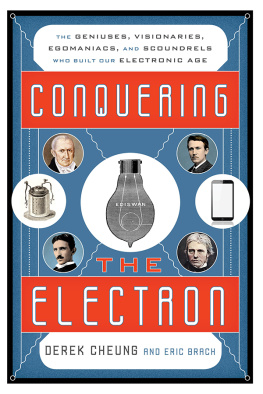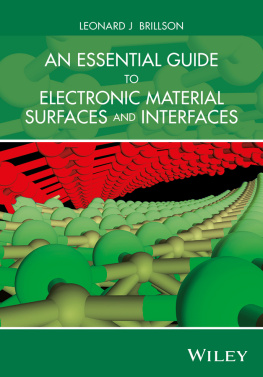Conquering the Electron
Conquering the Electron
The Geniuses, Visionaries, Egomaniacs, and Scoundrels Who Built Our Electronic Age
Derek Cheung and Eric Brach
ROWMAN & LITTLEFIELD
Lanham Boulder New York London
Published by Rowman & Littlefield
A wholly owned subsidiary of The Rowman & Littlefield Publishing Group, Inc.
4501 Forbes Boulevard, Suite 200, Lanham, Maryland 20706
www.rowman.com
16 Carlisle Street, London W1D 3 BT, United Kingdom
Copyright 2011 by Derek Cheung and Eric Brach
Translation copyright 2014 by Derek Cheung and Eric Brach
Originally published in Chinese by Commonwealth Publication, Taiwan.
All rights reserved . No part of this book may be reproduced in any form or by any electronic or mechanical means, including information storage and retrieval systems, without written permission from the publisher, except by a reviewer who may quote passages in a review.
British Library Cataloguing in Publication Information Available
Library of Congress Cataloging-in-Publication Data Available
ISBN 978-1-4422-3153-5 (cloth : alk. paper)
ISBN 978-1-4422-3154-2 (electronic)
 The paper used in this publication meets the minimum requirements of American National Standard for Information SciencesPermanence of Paper for Printed Library Materials, ANSI/NISO Z39.48-1992.
The paper used in this publication meets the minimum requirements of American National Standard for Information SciencesPermanence of Paper for Printed Library Materials, ANSI/NISO Z39.48-1992.
Printed in the United States of America
This book is dedicated to my father, Mr. Y. C. Chang, and to my teacher, Professor Gerald L. Pearson.
Derek Cheung
Introduction
L ook at your cell phone. If youre like most people, your phone is not really just a phone. In its tiny, light, and elegant package, it provides multiple incredibly powerful features and capabilities. Far beyond just making calls, todays phone can simultaneously function as a web-surfing terminal, an eBook reader, an electronic game center, a GPS navigator, a high performance camera, and a music player with its own personalized libraryto say nothing of the millions of other applications it can execute and perform. It runs via innovative hardware and software that are the results of many years of accumulated scientific and technological development, and whose existence is made possible by human beings ability to totally master the flow of electrons.
We may not realize it but, with the swipe of our fingertips across our phones screens, we are literally commanding billions of tiny electrons across silicon chips inside the phone, which are designed like microscopic maps of giant cities, interconnected by the bridges and tunnels of laminated wiring. Following our specific software instructions, these electrons tirelessly do massive amounts of work for us, from performing complex mathematical and logic functions to storing and retrieving information. At the same time, the compatriot of the electron, the radio wave, shuttles around in space, wirelessly delivering our coded messages and other data at the speed of light. These almost magical capabilities can be traced to the power of the tiny electron. This prompts inevitable questions: How did mankind conquer the electron? What was this discovery journey like? Who were the main contributors who led the way? And what have they accomplished?
This book presents the history of the conquest of the electron and how mankind has harnessed its immense power to benefit our lives. It is a development that ranks among the most impactful accomplishments ever made by the human race.
This history is told through a series of linked invention stories. Whether or not readers are previously familiar with the subject matter, these stories aim to be fascinating, informative, and directly relevant to our lives. Consider, for instance, the light bulb, invented by Thomas Edison. Every reader will be familiar with the devicebut how many readers understand how the light bulb works? And of those, how many can explain how the light bulb was commercialized and what methods were employed to help ensure its market success? Furthermore, of those still fewer in number, how many can connect the dots, explaining how Edisons past led to the devices creation, and how the device itself led to the creation of power plants and the electric power grid? Will the new LED lighting render Edisons bulb obsolete in the near future? From the telegraph to the iPhone and for dozens of major discoveries and inventions in between, this book will help readersregardless of their scientific backgrounds, whether extensive or nonexistent to connect the dots, fill their knowledge gaps, and gain total perspective about the continuous innovations that shaped our modern world.
The journey of human beings conquest of the electron is complex and long, with many intertwined epochal events and people involved. In this book, the series of linked invention stories are presented at a fast pace, in a chronologically consistent way, with a unique emphasis on insightfully delineating the connectivity of various inventionsthat is, the cause and consequence of how one invention leads to another. For example, you likely know that Alexander Graham Bell is credited with inventing the telephonebut do you know why he was working on the device in the first place? As it happens, he was actually trying to improve the operation of Samuel Morses telegraph; under pressure from his future father-in-law, he stumbled ontoor some might claim he stolethe novel idea of a telephone. History is full of cases like this. The technological innovation process is many-faceted. It is rare that inspiration or innovation take place in a vacuum; there are always specific scientific, marketplace, and personal agendas to consider!
Another emphasis for the book is to present balanced case histories of how major technical inventions lead to successful commercialization and ultimately impact the society. These cases clearly illustrate that no technical invention alone is adequate to usher in a new era. Besides the glamour of an invention, one also needs passion and courage for entrepreneurism, critical financial support, sound business management, and perfect market timing. An example of this is demonstrated in the series of cases that led from the invention of the transistor at Bell Labs to the birth of the microchip and personal computer, and the subsequent boom of Silicon Valley. Readers will see how, companies like Intel and Sony succeeded, while early pioneers such as Shockley Lab and Fairchild Semiconductor failed. These histories serve as valuable business cases for todays managers and entrepreneurs ready to build their own new technology-based businesses.
The continuous process of major breakthroughs in electronics technology has been like passing through a string of complex labyrinths, one after another. When looking back, many paths seem obvious; however, looking forward, when the future looms full of uncertainties and traps, the challenge to find the right path is never an easy one. Some of these maze-like hallways have proven to be dead ends, and entire lives and careers of brilliant researchers have wasted away in fruitless search for an exit. There have also been those who found one way out of their mazes, only to discover it was the wrong one, and they went astray on side paths that led to ultimate failure. Others succeeded in finding the right pathsometimes by pure chanceand still others followed them, broadening and leveling the way, allowing the next wave of explorers to cruise straight through in their wake. To the latecomers, the earlier mazes ceased to exist. For these people, their lot was to set their sights on the next mazes that lay further still beyond. Building on the successes of others, many trails would later merge to form an impressive, broader thoroughfare. Look, for instance, at the phone in your pocket: it represents the convergence of historical breakthroughs in wireless telephony, radio, television, GPS, and computing, as well as in component technologies such as the LCD and the incredibly versatile and powerful silicon chips! In this way, mankind has constantly pushed the frontier of technological development ever farther, and it continues to do so at an even more breathtaking pace.
Next page












 The paper used in this publication meets the minimum requirements of American National Standard for Information SciencesPermanence of Paper for Printed Library Materials, ANSI/NISO Z39.48-1992.
The paper used in this publication meets the minimum requirements of American National Standard for Information SciencesPermanence of Paper for Printed Library Materials, ANSI/NISO Z39.48-1992.